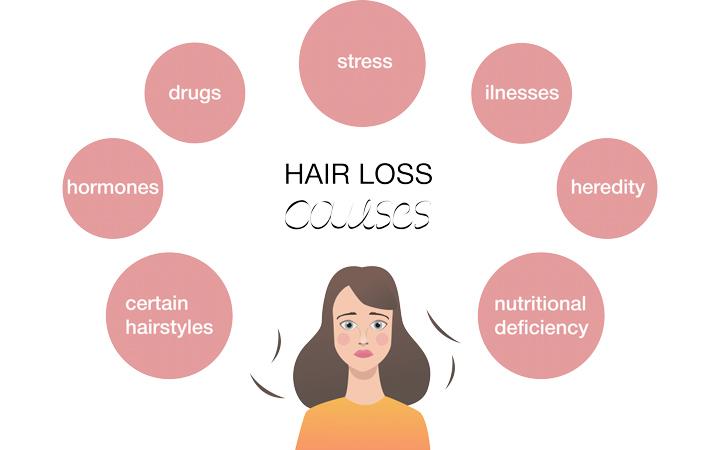Finding hair in your brush is normal: We shed. But if a person starts losing an unusual amount of hair, it can be cause for concern. Losing hair normally doesn’t have much effect on your appearance or warmth, as your head has plenty more to make up for the daily loss. But there may be a more significant reason for your hair loss when you start seeing your scalp or bald spots.
When you think of hair loss, you may think of genetic factors, such as male pattern baldness. Hormones, thyroid problems, and other diseases can all cause hair loss too. So, what are these various causes, and how do you know if they’re to blame for your excessive shedding?
Symptoms
Hair loss can appear in many different ways, depending on what’s causing it. It can come on suddenly or gradually and affect just your scalp or your whole body.
Signs and symptoms of hair loss may include:
- Gradual thinning on top of head. This is the most common type of hair loss, affecting people as they age. In men, hair often begins to recede at the hairline on the forehead. Women typically have a broadening of the part in their hair. An increasingly common hair loss pattern in older women is a receding hairline (frontal fibrosing alopecia).
- Circular or patchy bald spots. Some people lose hair in circular or patchy bald spots on the scalp, beard or eyebrows. Your skin may become itchy or painful before the hair falls out.
- Sudden loosening of hair. A physical or emotional shock can cause hair to loosen. Handfuls of hair may come out when combing or washing your hair or even after gentle tugging. This type of hair loss usually causes overall hair thinning but is temporary.
- Full-body hair loss. Some conditions and medical treatments, such as chemotherapy for cancer, can result in the loss of hair all over your body. The hair usually grows back.
- Patches of scaling that spread over the scalp. This is a sign of ringworm. It may be accompanied by broken hair, redness, swelling and, at times, oozing.
Causes
People typically lose 50 to 100 hairs a day. This usually isn’t noticeable because new hair is growing at the same time. Hair loss occurs when new hair doesn’t replace the hair that has fallen out.

Hormonal changes
Women may lose hair following childbirth or while in menopause. Women who have hormonal imbalances can have hair loss.
Aside from genetic male pattern baldness, men can lose hair as their hormonal composition changes with age. Hair loss is caused by your follicles’ response to the hormone dihydrotestosterone (DHT).
Thyroid disorders
Perhaps one of the most common hormone-related causes for hair loss is a thyroid problem. Both too much thyroid hormone (hyperthyroidism) and too little (hypothyroidism) can lead to hair loss. Treating thyroid disorder can often reverse hair loss.
Stress
Physical and psychological stress can cause hair loss. Surgery, high fevers, and blood loss can cause enough stress to result in excessive shedding. Childbirth can result in hair loss for several months after delivery.
As for psychological stress, the link is less well-defined. However, many people have reported losing hair at times of extreme mental stress or anxiety. And hair loss for other reasons can still be stressful.
The causes of physical stress are often temporary, and hair loss subsides as the body heals.
You can combat mental stress with lifestyle changes, such as:
- daily exercise
- proper nutrition
- meditation and other stress management strategies
- removing known stressors from your life
Nutritional deficiencies
Zinc and iron deficiency are the most common nutritional links to hair loss. But some evidence indicates that low intakes of the following vitamins and nutrients could also be to blame:
- fats
- vitamin D
- vitamin B-12
- vitamin C
- vitamin A
- copper
- selenium
- biotin
Lupus
Lupus is an autoimmune disease that can cause hair loss. Generally, the hair loss is patchy and accompanied by lesions on the scalp. Some lupus medications also may lead to hair loss.
Other medical conditions
Many other medical conditions can lead to abnormal balding, including:
- renal failure
- inflammatory bowel disease (IBD)
- liver disease
- diabetes
Skin conditions such as psoriasis and dermatitis can occur on the scalp and interfere with hair growth. Infections such as ringworm of the scalp and folliculitis can also cause hair loss.
The search for causes and potential treatments by people experiencing hair loss is understandable. Research has tied hair loss to lower self-esteem, body image issues, and increased anxiety. Many of these nongenetic causes for hair loss can be successfully treated, and the hair loss averted and even reversed.
